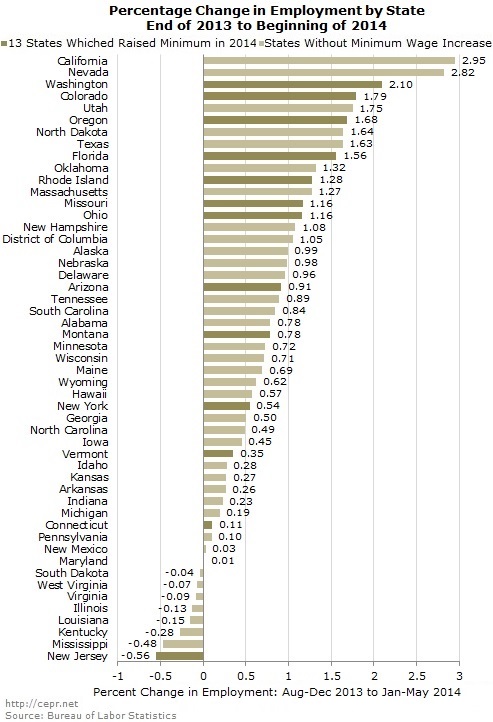Thanks to the South Dakota Democratic Party, we have the opportunity to vote for an economic stimulus package in November. When you vote to raise the minimum wage, you will not be voting to sandbag the economy. Quite to the contrary, there's a good chance you'll be voting to create more jobs, as suggested by Republicans' greatest enemy, empirical evidence:
Of the 13 states that increased their minimum wage in early 2014, all but one (New Jersey) are seeing employment gains. Furthermore, nine of the remaining 12 states are above the median for this period. The average change in employment for the 13 states that increased their minimum wage is +0.99% while the remaining states have an average employment change of +0.68% [Ben Wolcoott, "2014 Job Creation Faster in States that Raised the Minimum Wage," Center for Economic and Policy Research, 2014.06.30].
CEPR provides this chart showing job growth for the first five months of 2014 compared with the last five months of 2013:
South Dakota is actually among states where employment has recently stagnated or declined. The only state that has lost jobs immediately after raising its minimum wage on January 1, 2014, is New Jersey. (Blame the decline of gambling in Atlantic City? The highest out-migration rate in the U.S.? Chris Christie?)
CEPR itself recognizes that "While this kind of simple exercise can't establish causality, it does provide evidence against theoretical negative employment effects of minimum-wage increases." So when Governor Daugaard and the Chamber of Commerce wail that increasing the minimum wage will cost South Dakota jobs, you wave this CEPR report in their faces (and Saturday's report from John Tsitrian, and last July's report from Michael Larson) and say, "Next issue."
And be glad we're not asking for $15 an hour, or $21.72, or some other minimum wage that properly recognizes the dignity of workers.


Governor Daugaard is on the record as saying this should be an economic, not a political decision. I wholeheartedly agree and challenge him to live up to that standard. http://theconstantcommoner.blogspot.com/2014/07/the-myth-raising-minimum-wages-hampers.html
It is a lead pipe cinch that some jobs will be lost out of pure spite for anything Obama pushes. Like the ACA and some companies cut jobs before the plan was even in operation. Nothing like self-fulfilling prophecies to get wingnut base all riled up.
How did I forget,rethuglicans will demand more taxcuts for the koch bros to offset minimum pay raise. Another lead pipe cinch.
Note the most corrupt state governments at the bottom of that list.
This morning of CNN's Fareed Zakaris' GPS the last segment of the show dealt with South Dakota's 4% unemployment and specifically with Sioux Falls 3% unemployment and their need for manpower to fill an estimated 2,000 jobs. If I knew how to locate and post the podcast I would, perhaps a more talented reader can help with that.
The segment featured mostly Raven Industries and CitiBank with a comment about South Dakota being a tax haven for tax dodgers. It suggested that Sioux Falls' success was in part due to the mayor and SD governor working together, it did mention The Mall of America and Daugaard's kiosk to recruit workers.
The reason I bring this up is that I was disappointed that the program did not discuss wages or the minimum wage initiative and how they both impact Sioux Falls economic success.
What is evident is that the challenge Mr. Tristan issued to Gov. Daugaard is already working for the Sioux Falls mayor (memory lapse), he has successfully removed politics from economic development.
"Republicans' greatest enemy, empirical evidence:" great line, CAH.
More on this from a UC Berkeley-trained Economist, aka my daughter Emily: "It is my belief that raising the minimum wage can actually increase employment by coaxing marginal workers back into the job market. Controlled experiments are impossible in an actual economy, but anecdotal evidence is strong in this regard. Microeconomics can easily demonstrate this if you assume that there is a "monopsony" in labor markets (many sellers -aka workers; few buyers - aka employers)." Emily adds this link: http://www.businessinsider.com/krueger-card-fast-food-minimum-wage-study-2013-8. I repeat my challenge to Governor Daugaard to stick to his assertion that we should limit this discussion to economics and keep politics out of it.
http://www.msnbc.com/msnbc/poll-gop-couldnt-live-minimum-wage-still-wont-raise-it
Oh so typical.